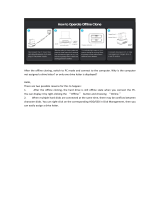
10400790-001104007nn-001104007nn-0011021970 Rev. E ©2016-19 Overland-Tandberg 7
SnapServerSnapScaleSnapCLOUDRDX QuikStation 4 and 8 Product Manual Contents
Connecting iSCSI Targets with CHAP for Windows ...........................................................................................33
Connecting iSCSI Targets with CHAP for Linux ...................................................................................................34
Connecting iSCSI Targets with CHAP for Mac OS X ..........................................................................................35
Chapter 4: System Configuration
System Settings Overview ..........................................................................................................................................38
Date and Time Configuration ...................................................................................................................................39
Network Configuration ...............................................................................................................................................40
Port Configuration Options ..................................................................................................................................44
Notification Configuration .........................................................................................................................................45
Setting Basic Email Notification ...........................................................................................................................46
Setting SMTP Authentication ................................................................................................................................46
Customizing Email Subject and From Address ...................................................................................................47
User Management ......................................................................................................................................................47
Group Permissions Overview ...............................................................................................................................47
Adding Users to a Group ......................................................................................................................................48
Removing Users from a Group .............................................................................................................................49
Editing User Information ........................................................................................................................................49
Recovering the Built-In Administrator Password ................................................................................................50
Convert Device Type .................................................................................................................................................54
Options for RDX QuikStation ......................................................................................................................................55
Setting Removable Disk Options .........................................................................................................................56
Setting the Auto-Insert Option .............................................................................................................................57
Chapter 5: Logical Device Management
Logical Device Type Overview .................................................................................................................................60
Select the Logical Device Type ................................................................................................................................61
RDX Targets ..................................................................................................................................................................62
RDX Individual Dock Drives ..................................................................................................................................62
RDX Logical Volume .............................................................................................................................................63
Logical Volumes ..........................................................................................................................................................65
Creating a Logical Volume .................................................................................................................................65
Importing a Logical Volume ................................................................................................................................66
Expanding a Logical Volume ..............................................................................................................................67
Erasing a Logical Volume .....................................................................................................................................68
Exporting the Logical Volume .............................................................................................................................69
Protected Volumes .....................................................................................................................................................70
RDX Protected Volume ........................................................................................................................................70
Creating a Protected Volume .............................................................................................................................72
Importing a Protected Volume ...........................................................................................................................72
Expanding a Protected Volume .........................................................................................................................73
Expanding a Fixed Logical Volume File System for a Window Host ................................................................74
Expanding a Removable Logical Volume File for a Windows Host ................................................................76
Erasing a Protected Volume ................................................................................................................................77
Exporting the Protected Volume .........................................................................................................................77
Recovering a Degraded Protected Volume .....................................................................................................78
Disk Autoloader ...........................................................................................................................................................80
View Logical Properties for Autoloaders ............................................................................................................81
View Active iSCSI Connections Autoloaders .....................................................................................................81
Move a Media Cartridge .....................................................................................................................................81
Set the Autoloader Option ..................................................................................................................................82




























